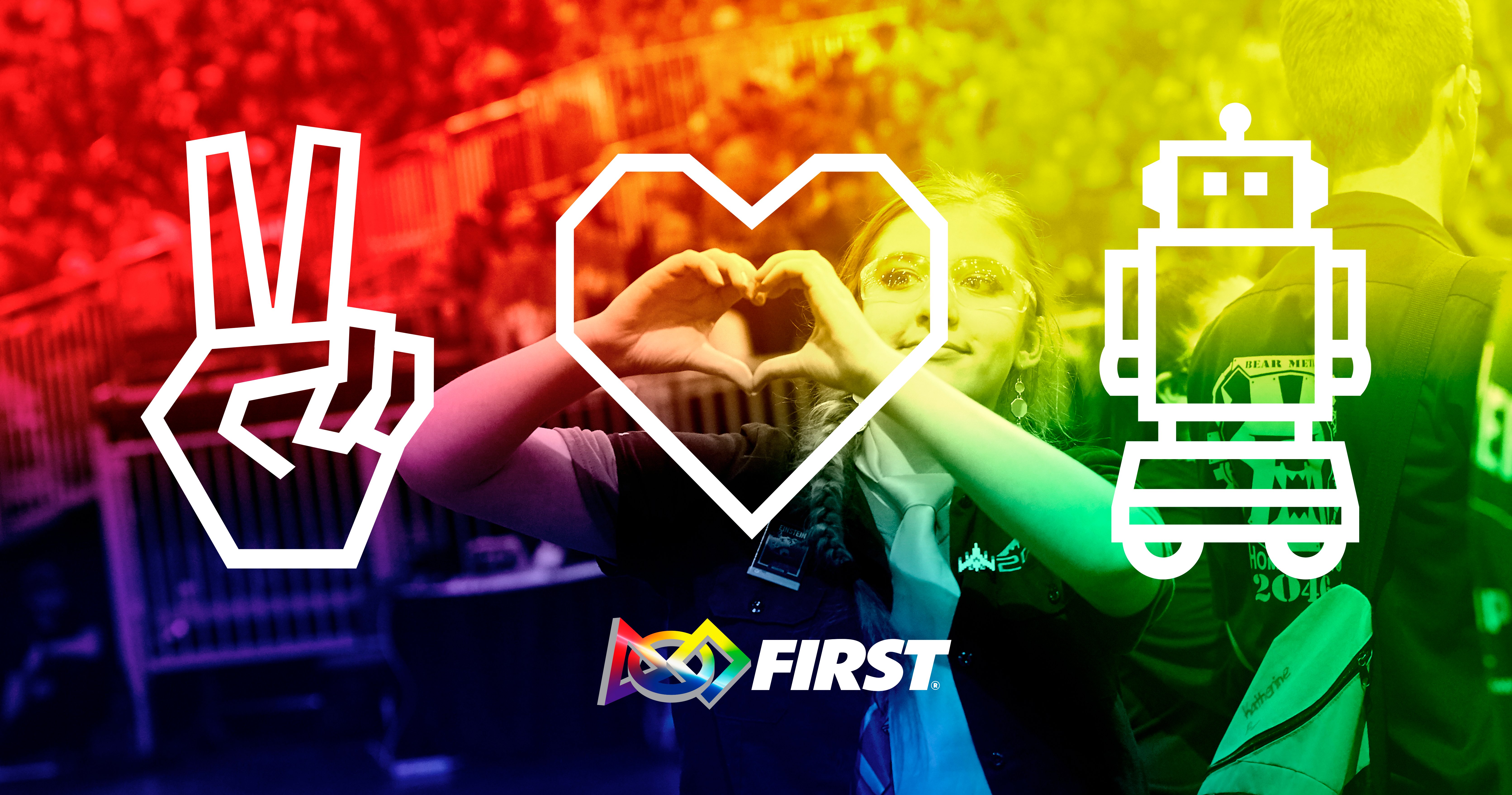By Devin (he/him/they/them)

We’re celebrating Pride Month by amplifying the voices and experiences of individuals within the LGTBQ+ community. This series of contributed blogs has been written by members of LGBTQ+ of FIRST, a student-led organization that advocates for awareness and acceptance of LGBTQ+ students, mentors, and volunteers within the FIRST community.
While we all hope to find a sense of community on our FIRST team(s), that is not always a hope that comes with ease. The majority of the FIRST community fosters a loving and supportive atmosphere, but sometimes LGBTQ+ students find themselves on teams that are resistant to acceptance. In this situation, it is essential that the student prioritize their safety.
My name is Devin, and I have been on a FIRST team for over three years. I have also been in a position like the one mentioned above with my team before. Below, I have compiled some of the biggest things I have learned from my own experiences, including how to prioritize your safety and how to address the root of the situation on teams that are resistant to acceptance. This is not a failproof guide, nor is it exhaustive, but my hope is that other students who are struggling with acceptance on their team can benefit from hearing my lessons learned.
Safety First
While you may want to be out and proud, make sure it is safe first. If your mentors find out, will they tell your family? And if they do, will you be safe at home? If you come out to your peers, are you putting yourself in danger of bullying or harassment? And if you are put in such a situation, will you have mentors or other trusted adults on your side, or will they turn a blind eye? If you use the bathroom of the gender you identify as at meetings, will you face backlash?
Before you act, always consider your safety. Rumors can spread fast, and keeping your anonymity is sometimes your best option. If stepping back and letting the community stay as it is for the time being is all you are comfortable doing, you don’t need to endanger yourself to change it. If you do choose to act, make sure you have a support system who will back you if things don’t go as planned.
Bring Issues to an Adult
This point may seem obvious, but if there is someone you can bring your concerns to, you should. If students are causing issues, talk to a trusted mentor. If a mentor is causing issues, look for a trustworthy mentor with authority over them, or school administration if applicable. Family may be able to help if they are someone you are out to and trust.
If you are planning to talk to an adult, gather evidence and specific instances of problems with each person involved if possible. It is best to collect yourself and your information before you begin, but if you don’t have any specific evidence to bring, you don’t need to wait. It is better to deal with issues sooner rather than later if possible. Prepare yourself for possible questions, such as what you suggest they do, what you have done to try to resolve this yourself, who else may be affected, and how long this has been happening. Make sure your trusted adult is not preoccupied and has your full attention. Try to keep a level of professionalism to encourage the adult to take your experiences seriously.
Facing People Yourself
While bringing issues to adults is ideal, it isn’t always possible. If you feel the best course of action is to talk to someone yourself, make sure you are prepared for potential backlash. Collect yourself calmly to avoid escalating the situation and be sure they are aware that you respect them and simply want to help them encourage gracious professionalism and foster a safe space for everyone. Keep a safe support system to go to afterwards if things don’t go as planned. Prepare your points beforehand and, again, be ready for potential questions.
Students are best approached with a casual conversation. Explain how hurtful their words and actions are, how to improve, and why fostering an inclusive environment is important. Mentors are better approached with relevant resources, such as those available through the LGBTQ+ of FIRST or FIRST Equity, Diversity, and Inclusion, and a sense of formality. Keep it short but speak enough on the importance of inclusion to encourage them to look at the resources you brought. You might even consider contacting a mentor via email instead of in-person.
Fostering a Safe Space
If you feel comfortable, one of the easiest ways to combat a community lacking inclusion is to start the trend yourself. When introducing yourself to others, include your pronouns and encourage others to do the same. Let new members know that if they need someone safe to go to about anything, including LGBTQ+ topics, you are a safe person who will keep their confidentiality. Continue to vocally encourage your team’s leadership to take action. If your team is lacking vocally supportive members, be that person and others will likely follow along.
Important Things to Remember
If all else fails, or for your safety, none of the above steps are possible, there are still a few things to keep in mind. First, your FIRST team is not your only community. Through all my troubles on my team, what kept my head up was the community I found in LGBTQ+ of FIRST. I had a partner team in my area who I had friends on and who hosts meetups at events in my area. I was, and am, an active member of the LGBTQ+ of FIRST Discord server.
Secondly, time heals. People come and go on robotics teams all the time. My sophomore year, our team was run by a boy who disrespected the LGBTQ+ community and personally insulted me and my friends regularly. Freshmen members looked up to him and followed his behavior. It was a horrible time, but it only lasted for that year. Before I knew it, he was gone. My team is still healing from that season, but things have gotten so much better. One day, no matter how hopeless it seems, things will be better.
Lastly, but easily the most important point on this list, if you need help, ask for it. If you feel that your team, a volunteer, an event coordinator, etc. is not following the FIRST Equity, Diversity, and Inclusion Statement and is not acting graciously professional, you have the option to submit an anonymous Non-Medical Incident Form, and FIRST will look into the situation. If you have a trusted adult you are out to, don’t hesitate to talk to them about the situation. You deserve to feel accepted and included, and you shouldn’t feel scared to reach out for help if you need it.
To learn more about how to create a more inclusive environment on your FIRST team, check out our Equity, Diversity, and Inclusion trainings and resources, as well as our new partnership with Project THRIVE and the Human Rights Campaign Foundation.
